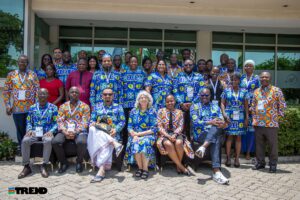
The PROMISE Consortium is a global collaboration of research institutions and government partners from Bangladesh, Ghana, Senegal, Kenya, Uganda, Tanzania, Zambia, and the United States. Funded by the Gates Foundation and the Reckitt Global Hygiene Institute (RGHI), PROMISE strengthens the WASH sector by building capacity and providing technical assistance for the use of public health data to inform water, sanitation, and hygiene programs and policies. Focus areas include: safely managed sanitation, food hygiene, and infection prevention and control in healthcare facilities.
Grounded in equitable partnerships, PROMISE is committed to translating scientific evidence into actionable policies and practices that improve health outcomes and advance sustainable development.
In April 2025, the Training, Research and Networking for Development (TREND) Group, in collaboration with Ghana’s Ministry of Local Government, Chieftaincy and Religious Affairs, hosted the PROMISE Consortium Annual Workshop in Accra, Ghana. Held at the Alisa Hotel from April 7–11, the workshop convened WASH leaders, researchers, and policymakers under the theme “Strengthening Evidence-Based Decision-Making in WASH Policy and Strategy.” Participants engaged in hands-on tool trainings (including WASH-FIT, SaniPath, and COMPASS), country case studies, field exercises, and facilitated planning sessions. The workshop also served as a platform to recognize the contributions of leaders in the sector, including Emory University’s Professor Christine Moe, for her role in advancing evidence-based WASH approaches globally.
Key insights emerging from the workshop included: